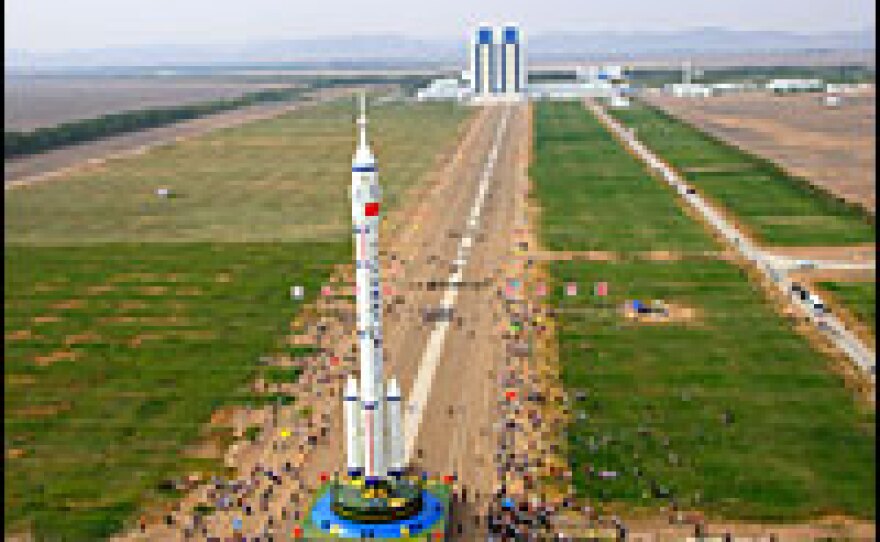The opening ceremonies for the Beijing Olympics included not just drummers and dancers, but also performers dressed as glowing astronauts. Now, just a few weeks after hosting the games, China is about to launch three men into orbit.
It's the country's most ambitious space mission yet, and China is expected to complete its first spacewalk. That has some people wondering about another kind of walk for China — on the moon.
Back in 2003, China became the third nation to put a man into orbit. China's first space excursion was a quick one-day, up-and-back affair. But two years later, China counted down to a more complex mission: It launched two men into space. The astronauts spent nearly a week orbiting Earth.
Now, coverage of the next launch — which could happen as soon as Thursday — is dominating China's news agencies. This time, the capsule will carry three astronauts. One of them will step out into space and go for a stroll, and the feat may be shown live on TV.
Meanwhile, China has a small probe orbiting the moon. It was sent up in October on a mapping mission. Earlier this month, it broadcast special greetings for China's autumn celebration, known as the Moon Festival. China also has plans for a robotic moon rover. So it is perhaps not surprising that lately, whenever NASA administrator Michael Griffin goes to Capitol Hill to testify about the space agency's budget woes, talk turns to China's lunar intentions.
Earlier this year, Griffin told lawmakers that his views on China had changed.
"A few years ago, I was not particularly concerned about Chinese primacy in human spaceflight relative to that of the U.S.," he said. But after visiting China in 2006, Griffin said, and noting the country's progress in space since then, he thinks the nation could shoot for the moon.
"I have become convinced that it is possible for China to mount a human lunar mission toward the end of the next decade and quite possibly before we are able to return," he said. NASA is building a new spacecraft to return Americans to the moon around 2019.
In a speech last week, Griffin said he wasn't trying to "engender a new space race with China." But he did note that China was developing a new rocket that could soon put its manned capsule into orbit around the moon, like Apollo 8. And in the past, Griffin has noted that China says it has 200,000 people working on its space program.
Some analysts who watch China's space program say all of this may be true, but the fact that China could aim for the moon doesn't necessarily mean it plans to.
"China is relatively closed about its plannings for its space program, but they have never made a statement that they intend to have a manned mission to the moon," said Gregory Kulacki, who does work in China for the Union of Concerned Scientists. He knows a lot of researchers in China's space program, and he's in China now for the launch. Chinese officials are frequently asked about a manned lunar mission, he said.
"The standard answer to that question is 'No, there are no plans at this time, but that's something we might think about in the future,' " he said.
He says for two decades, China's space program has been following one plan.
"The goal of that plan is not to put people on the moon but in a permanently manned Chinese space station in orbit — that's their goal," he said.
Even if China did start rushing to the moon, budget constraints would make it hard for NASA to speed up its own lunar plans. Congressman Bart Gordon (D-TN) is chairman of the House Committee on Science and Technology.
"With the meltdown in the financial sector, the price of gas, so many problems that face our country right now, this is not a high-level issue for Congress as a whole," Gordon said.
After all, the American flag is already on the moon. NASA put it there nearly 40 years ago.
Copyright 2022 NPR. To see more, visit https://www.npr.org. 9(MDAzMjM2NDYzMDEyMzc1Njk5NjAxNzY3OQ001))







